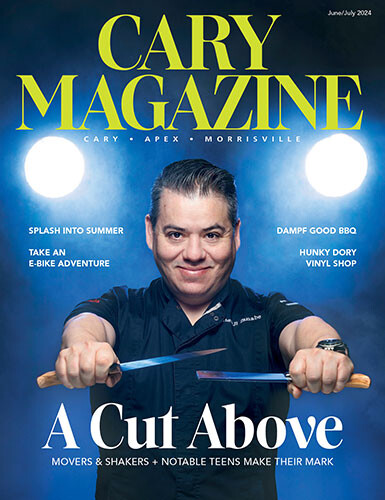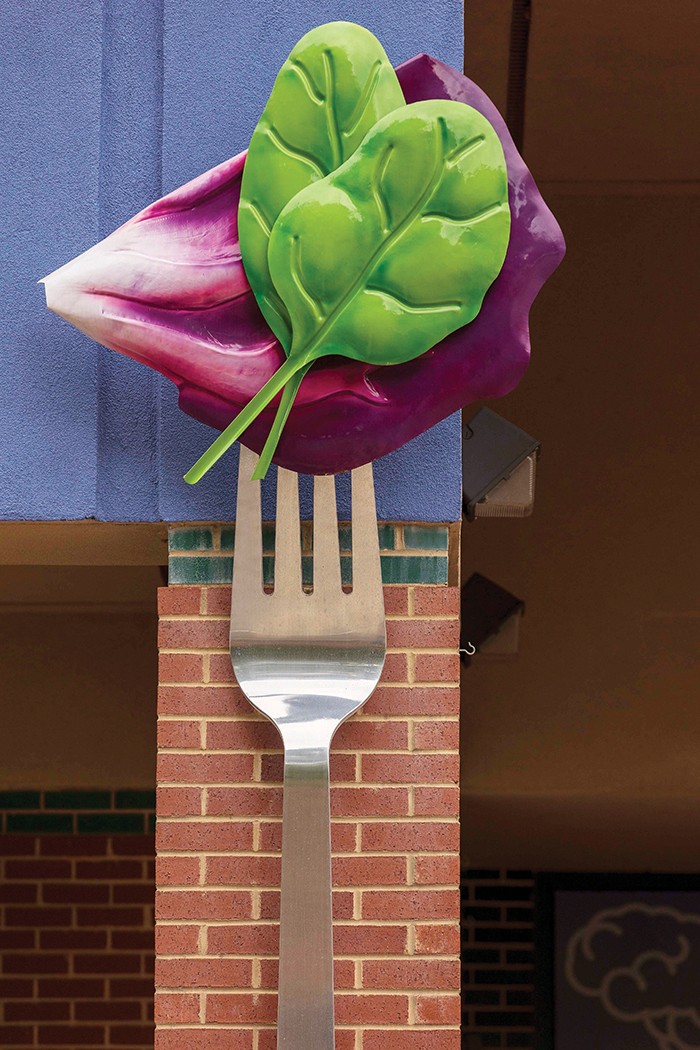Originally the brainchild of the Wake County Medical Society Alliance, The Alice Aycock Poe Center for Health Education — known as “The Poe Center”—was officially established as a nonprofit in 1991. Since then, the organization has been dedicated to positively impacting the lives of NC youth through health education for over three decades. With more than 50 unique and interactive programs that help children learn in fun and engaging ways, they have educated more than 1.3 million participants from 94 counties.
“The Poe Center provides health education that many times isn’t able to be taught in schools,” said Ann Rollins, the executive director at Poe. “It’s essential to know how to brush your teeth or floss, or how to prepare healthy food. Our founders thought that this was too much to ask classroom teachers to do, so they founded Poe so we could do it in a fun and interactive way. We feel like children and families deserve to have this kind of exposure and programming.”
The center itself is a one-of-a-kind field trip destination, featuring museum-quality exhibits and indoor teaching theaters that cover everything from dental health to substance use prevention. The center’s CookWELL kitchen provides programming focused on kitchen safety and nutrition, while the GrowWELL garden (complete with beehives) works in tandem to ensure that the center remains garden-to-table. As a SNAP-Ed implementing agency (a federal/state partnership supporting nutrition education for those eligible for supplemental nutrition assistance), the Poe Center is able to provide nutrition education and food to many low-income families.
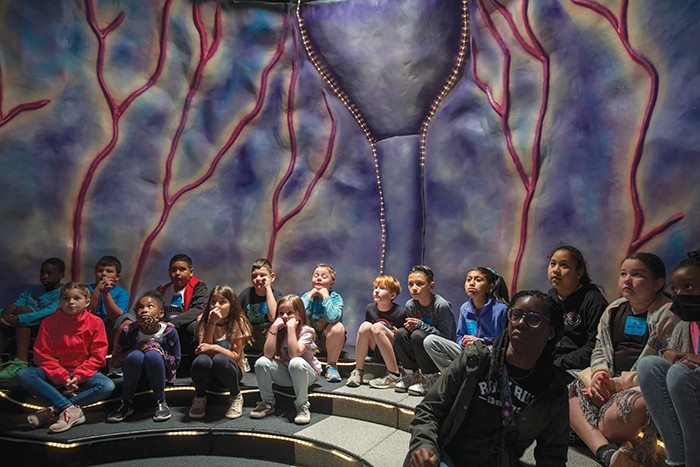
Rock Ridge Elementary third-graders sit in the Cranium Connection’s “brain theater” to learn about brain health at the Poe Center for Health Education.
“We have covered picnic areas in the park, and we were the first in Wake County to start doing open summer feeding programs when the kids were out of school,” said Rollins. “The program only covers children from 0 to 18, so we harvest our garden and provide the parents with fresh vegetables when they arrive.”
At over 15,000 square feet, The Poe Center could be described as a campus rather than a building, with exhibits stretching outside as well as in. PlayWELL — the world’s first health education playground — sits on 1.5 acres and features a nerve net, a zipline between two giant ears, a tongue slide, and much more. One of the center’s most popular exhibits is The Cranium Connection — a 12-foot-tall interactive human head where children can enter behind the ear and view a brain health education program through two large monitors located within the eyes.
The dental health theater is sponsored by Delta Dental NC, with different programs available for preschool to third grade.
“Tooth decay is among the most chronic childhood diseases in the United States, and it’s entirely preventable,” said Elaine Loyack, VP of community engagement with Delta Dental of NC. “This is why we partner with organizations like Poe Health and help fund programming that teaches children good oral habits.”
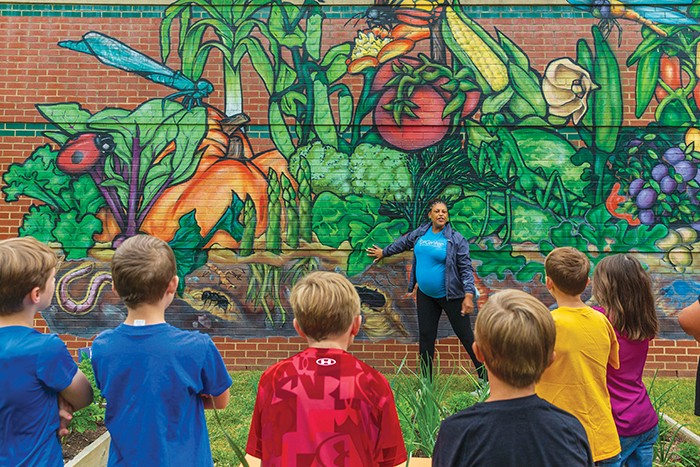
Poe Center for Health Education instructor Catherine Wills teaches students about seasonal fruits and vegetables at the GrowWELL Garden, an interactive an outdoor classroom.
Loyack was first introduced to Poe after attending Girl Talk, one of the center’s most popular programs that educates girls about adolescent growth and what to expect during puberty, with her daughter.
“We reach girls in about fourth or fifth grade, and they learn about puberty and menstruation, and it takes a big weight off the moms, so it has been wildly successful,” said Rollins. “We also have Guy Talk. Teachers don’t want to do it, and parents are nervous about it, so it’s nice to put them in a big group with our health educator, who is amazing.”
One of Poe’s newest initiatives is the MindWELL Mental Wellness program. In 2019, a study revealed that NC youth were in a mental health crisis, with 36.3% of high school students reporting feeling sad or hopeless. Once the pandemic started, even more youth reported feeling isolated and anxious, with many experiencing trauma, financial hardships, food insecurity, loss, and mental/emotional trauma.
“MindWELL programs support individual resiliency through a focus on health decision making, positive peer relationships, empathy, and self-care,” said Jessica Fowler, the MindWELL manager and substance use prevention specialist. “Our one-of-a-kind environment incorporates gardening, nutrition, physical activity, and cooking as examples of positive coping strategies that support holistic wellness while reducing stress and anxiety. Poe acknowledges the value of using a trauma-informed lens approach in understanding the trauma youth experience — including racism, inequity, and social justice — and continues to invest in the ongoing education of our staff.”
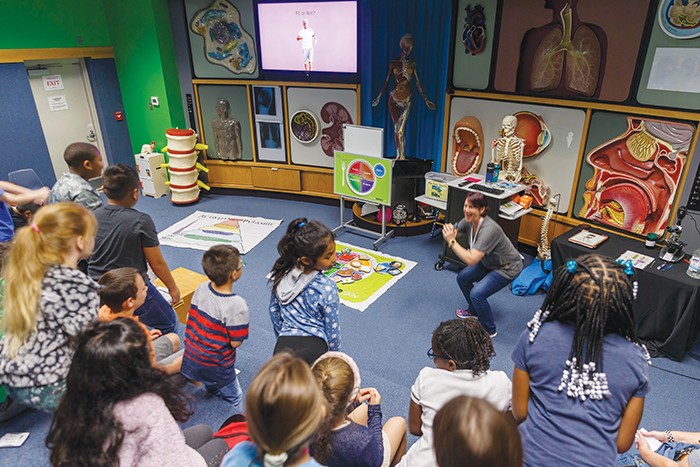
Instructor Jen Zerda teaches students how physical fitness benefits every aspect of their lives during the Play Hard, Stay Fit program at Poe Center for Health Education.
In addition to youth programs, The Poe Center also offers health education programs for adults, where participants learn about their own health and how to support the healthy decisions of the children in their lives. Programs are available onsite at the Poe Center or offsite, bringing their props and enthusiastic health educators directly to your school/organization. Due to past Covid restrictions and the fact that the Poe Center is a statewide agency, many programs are offered virtually (along with interactive, online exhibits). In some cases, The Poe Center will tailor programs to address whatever need your school or organization has.
The Poe Center accepts volunteers of all ages, and volunteer applications and donation opportunities can be found on their website. For those who want to donate items, the center also maintains a wish list of items they need for their facility, garden, and programs.
“It’s all about empowering our youth and families in NC to make healthier decisions and lead healthier lives, and all of our programs have that at their core,” said Amy Amerson Campbell, board president at The Poe Center. “We’re now in our fourth decade, and I’m super impressed with the fact that we’ve continued to grow and evolve with what the needs are. It’s not stagnant. It’s not static. We’re constantly looking at what we are doing and how we can continue to help our community.”
Want to know more? Visit poehealth.org to volunteer, donate, or find a program that meets your specific needs.
- Things to Do: June/July 2022
- Notable Teens 2022
- The Rise of Board Game Cafés
- Family Volunteerism
- Sea-nic Boat Racing
- Small Business Spotlight: Bumble Brews
- Nonprofit Spotlight: The Alice Aycock Poe Center for Health Education
- Restaurant Profile: A’Verde Cocina + Tequila Library
- Bibibop
- Liquid Assets: The Ultimate Bloody Mary from The Blind Pelican Seafood House
- Liquid Assets: Crème de l’Orange Cider from Bull City Ciderworks
- On Trend: Private Theater Rentals at Paragon Theaters
- Garden Adventurer: Naked Gardening
